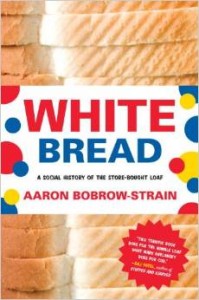I’ll Make It Myself!: White Bread: A Social History of the Store-Bought Loaf
L.M. Zoller (CIR Ishikawa-ken, Anamizu, 2009-11) is the editor of The Ishikawa JET Kitchen: Cooking in Japan Without a Fight. Ze works in international student exchange; writes I’ll Make It Myself!, a blog about food culture in Japan and the US; curates The Rice Cooker Chronicles, a series of essays by JETs and JET alumni on the theme of cooking/eating and being alone in Japan; and admins The JET Alumni Culinary Group on LinkedIn.
White Bread: A Social History of the Store-Bought Loaf
Aaron Bobrow-Strain
Beacon Press, Boston. 2012
For those interested in food history and culture, White Bread: A Social History of the Store-Bought Loaf, which mainly deals with US bread culture, also covers the rise of shokupan (食パン) in Japan, specifically how SCAP tried to use bread and other “democratic” pastimes (kissing in films, for example) to “break” Japan of its “imperialist notions.”
Although Bobrow-Strain isn’t a Japan specialist, his careful treatment of Japanese food culture and its globalization is a welcome change from mainstream media’s obsession with wacky Japan and even NPR’s weirdly one-sided articles.
I’ll Make It Myself!: Baudrillard and the Food Truck: Dragon Fest 2013
L.M. Zoller (CIR Ishikawa-ken, Anamizu, 2009-11) is the editor of The Ishikawa JET Kitchen: Cooking in Japan Without a Fight. Ze also writes I’ll Make It Myself!, a blog about food culture in Japan and the US; curates The Rice Cooker Chronicles, a series of essays by JETs and JET alumni on the theme of cooking/eating and being alone in Japan; and admins The JET Alumni Culinary Group on LinkedIn.
New Rice Cooker Chronicles submissions always welcome. Just e-mail it to jetwit [at] jetwit.com.
One of the aspects I hadn’t anticipated as much regarding my culture shock expectations was adjusting to Americanized- and fusion Japanese food, especially for foods that I encountered for the first time in Japan. This isn’t to say that American-Japanese food isn’t delicious–quite the contrary–but it can be a bit alarming at times to see sushi rolls cooked tempura-style (why?) or cilantro in your temaki (YES). If nothing else, it serves as a reminder of my relative inexperience with the Japanese home cooking when I left to study abroad in university and the problematic nature of the idea of a food’s authenticity.
Dragon Fest is an annual celebration of pan-Asian cultures held in Seattle’s International District.
I’ll Make It Myself: “Deeply Ingrained Advantages”: American Media Discovers Kyûshoku
L.M. Zoller (CIR Ishikawa-ken, Anamizu, 2009-11) is the editor of The Ishikawa JET Kitchen: Cooking in Japan Without a Fight. A writer and web administrator for The Art of Travel, ze also writes I’ll Make It Myself!, a blog about food culture in Japan, and curates The Rice Cooker Chronicles, a series of essays by JETs and JET alumni on the theme of cooking/eating and being alone in Japan, and The JET Alumni Culinary Group in LinkedIn.
New Rice Cooker Chronicles submissions always welcome. Just e-mail it to jetwit [at] jetwit.com.
Can Japan solve America’s food identity crisis? Japan’s relatively low rates of obesity have caught the eye of the American news media, particularly in light of our own new government controls on junk food and measures intended to prevent childhood obesity. In January, The Washington Post ran the article “On Japan’s school lunch menu: A healthy meal, made from scratch” by Chico Harlan; NPR followed up article/radio segment on bento called “In Japan, Food Can Be Almost Too Cute To Eat” by Audrey Carlsen and Daniel N.M. Turner, featuring a radio interview for All Things Considered with host Audie Cornish and author Debra Samuels.
While it is true that the content and presentation of Japanese school lunches (kyûshoku, 給食) and boxed lunches (bento) are quite different from their stereotypical American counterparts, both articles oversimplified the topics. I’d like to focus on each article separately as my criticism for each deals with distinct rather than overlapping issues. First, I’d like to discuss The Washington Post piece’s failure to address some of the negative aspects of the Japanese diet, and, in a separate post, how the NPR piece misses the mark on the “cute” issue and ignores the gendered social issues behind the bento.




